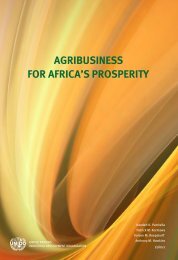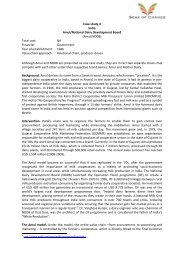Collection of Case Studies 2. - Seas of Change Initiative
Collection of Case Studies 2. - Seas of Change Initiative
Collection of Case Studies 2. - Seas of Change Initiative
You also want an ePaper? Increase the reach of your titles
YUMPU automatically turns print PDFs into web optimized ePapers that Google loves.
where peace was recently restored after some 20 years <strong>of</strong> insurgency. With the return <strong>of</strong> peace, Mukwano sawthe opportunity to promote business and investment by developing a local oilseed market, providing analternative to imported palm oil. Apart from Mukwano, 36 other smaller processing mills exist in NorthernUganda. Until 2010, when Mt. Meru millers entered the market, Mukwano enjoyed up to 70% <strong>of</strong> market share,while the small millers who operate under an umbrella organisation, NUOMA (Northern Uganda Oilseed MillersAssociation) accounted for the remaining 30%.In the past, Mukwano worked with the Ugandan Oilseed Producers and Processors Association (UOSPA) to secureuptake <strong>of</strong> Sunfola, an open-pollinated sunflower variety. Unfortunately, the oil content and farm yield <strong>of</strong> this varietywas relatively low and inhibited farmer production and expansion. Following the introduction <strong>of</strong> the new sunflowerhybrid PAN 7351 variety in 2003, which provided better yields than the open pollinated varieties, Mukwanopromoted sunflower production through field demonstrations, which stimulated demand for improved productiontechniques. The company increased its grain uptake from less than 5,000 metric tonnes (mt) in 2004 to over40,000 mt in 2008, with a value <strong>of</strong> US$11 million from an out-grower scheme involving about 45,000smallholder farmers.Currently, Mukwano supports an out-grower scheme <strong>of</strong> approximately 54,000 smallholder farmers in the districts<strong>of</strong> Masindi, Oyam, Apac, Lira, Dokolo, Kaberamaido and Amolatar, making it a lead firm in the sunflower valuechain in Uganda. There is interest and potential among farmers in this region to increase sunflower production toexceed 100,000 mt per annum.<strong>2.</strong> Underlying business modelThis case focuses on the contract farming model which Mukwano developed, together with SNV, with out-growerschemes for 54,000 farmers, 35% <strong>of</strong> which are women. However, this contract farming model was facilitated bythe processes initiated by the Oil Seeds Sub-Sector Platform (OSSUP). The platform was initiated by UOSPA, as an experiment to promote more co-ordinatedaction in the oil seeds subsector. UOSPA, representing oil seed farmers and small oil processors, had alreadyworked with several donors in the past, but these actions had never proved to be sustainable. Without thisintervention, actions such as the contract farming model developed by Mukwano, would have been much moredifficult. This was because OSSUP is a multi-stakeholder platform in which the main actors in the oil seed sector,such as Mukwano and UOSPA, came to set a prioritised agenda, which was shared with other parties who had thecapacities and the resources to facilitate change. It was possible to set this prioritsed agenda due to certainconditions such as the growing trust between actors and a more nuanced view <strong>of</strong> each other roles. Thisappreciation <strong>of</strong> each other’s diversity accommodated a system in which deals could be made and solutions couldbe found. One <strong>of</strong> the actions facilitated by the platform was this setting-up <strong>of</strong> an out-grower scheme by Mukwano.Before 2009, Mukwano Industries dealt with about 40,000 individual farmers for its supply <strong>of</strong> hybrid sunflowerseeds. This model was costly; it did not guarantee supply <strong>of</strong> oil seeds for Mukwano and disadvantaged farmersby limiting their ability to participate in chain activities, sharing <strong>of</strong> margins, bargaining power and sustainability <strong>of</strong>incomes. Mukwano developed a contract farming model with out-grower schemes for 54,000 farmers, 35% <strong>of</strong>which were women. With support from SNV, the farmers were organised into 1,860 functional ProducerOrganisations (POs) <strong>of</strong> around 30 farmers each. SNV Uganda worked with Mukwano to enable producers withmarket access, since interacting with markets is an important aspect <strong>of</strong> the livelihood strategies <strong>of</strong> many ruralpoor producers. This was done by addressing three core issues:(i) Physical access to markets is most <strong>of</strong>ten limited by longdistances and lack <strong>of</strong> roads and/or impassable roads.Difficulties in accessing markets reduce opportunities forrural farmers, limiting their ability to buy improved inputs(seeds) and sell their farm output pr<strong>of</strong>itably. To resolve thissituation, Mukwano established input sales and procurementcentres at a parish level all over the out-grower scheme. Thisimproved the incentives for producers to engage in morepr<strong>of</strong>itable sunflower production.(ii) Market structure – characterised by extreme asymmetry<strong>of</strong> relations between the large numbers <strong>of</strong> rural poor farmersand the few market outlets. Such markets are usually28







